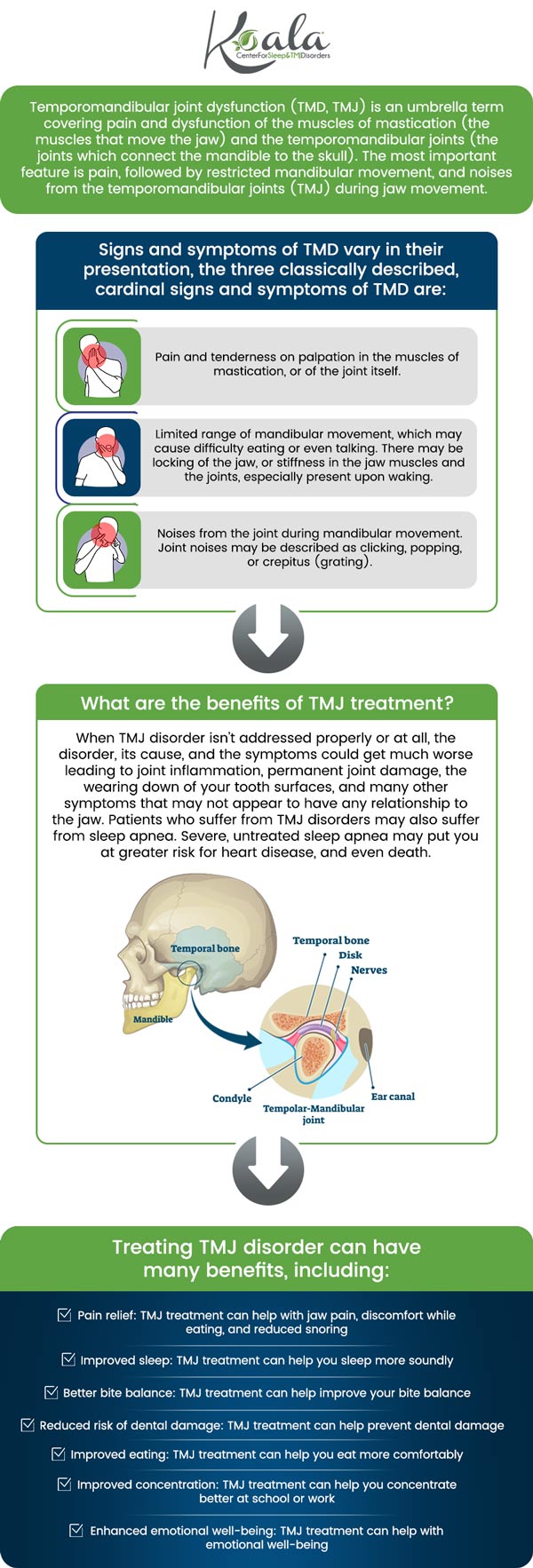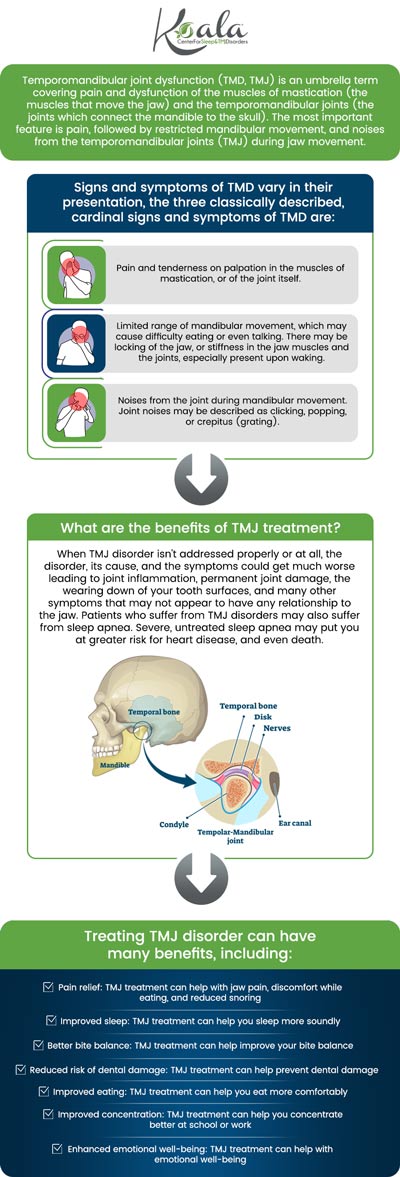TMJ Doctor in El Paso, TX
A TMJ doctor specializes in diagnosing and treating temporomandibular joint (TMJ) disorders, which can cause jaw pain, headaches, and difficulty chewing. At Koala® Center for Sleep & TMJ Disorders, our experts provide personalized treatment options to relieve discomfort and restore proper jaw function. If you’re experiencing TMJ-related symptoms, our team is here to help. For more information, contact us or book an appointment online. We are conveniently located at 6901 Helen of Troy, Ste D-2 El Paso, TX 79911.




Table of Contents:
What is TMJ?
How do you diagnose TMJ?
What could happen if I choose not to treat my TMJ?
What are the causes of TMJ?
Many people living with a TMJ disorder are not even aware that they have the condition. When they find out that their symptoms are attributed to a disorder with their temporomandibular joint, they will likely have a lot of questions about their condition, such as what is causing it, and how to fix it. The temporomandibular joint connects the jaw to the skull and enables its sliding-hinge action, allowing us to eat, talk, and drink. Common symptoms associated with this joint dysfunction include a popping sound, a grinding or grating sensation, as well as localized pain in the jaw and surrounding area. TMJ disorders can also cause pain in the neck or face.
The temporomandibular joints (TMJ) are the two joints that connect the jaw to the base of the skull. They are the joints that slide and rotate in front of each ear, enabling the jaw’s hinge-like action. The TMJs are among the most complex joints in the body due to the intricacy of their interworking parts and components. These joints, along with several jaw and facial muscles, allow the mandible (jawbone) to move side to side, up and down, and back and forward. When the mandible and the joints are properly aligned, we are often unaware of them, as they do not present any problems. However, when these structures are not aligned, several problems may occur, including pain, audible clicking or popping sounds, and limited range of motion in the jaw joint.
The diagnosis for TMD depends on its cause, severity and duration. It can be caused by many factors, including biological, social, environmental, emotional, and cognitive triggers. Diagnosis of TMJ disorder is most often based on the health history of the patient and the findings of a physical examination. When malocclusion or intra-articular abnormalities are suspected, diagnostic imaging may be beneficial. Most patients improve with a combination of noninvasive therapies, including self-care, patient education, occlusal devices, and physical therapy. Non-steroidal anti-inflammatory drugs and muscle relaxants may be initially recommended; however, the long-term use of medications is not typically suggested. Dentists can effectively diagnose TMJ disorders and determine the root cause of the problem. Once the root cause has been addressed, long-term relief becomes a possibility.
Leaving TMJ disorders untreated can lead to many complications, including:
The condition becoming worse or more severe, which may include:
-Severe headaches
-Back pain, shoulder and neck discomfort
-Tinnitus
-Teeth grinding
Damage to the teeth, which is a likely possibility of untreated teeth grinding, a common culprit of TMJ disorder
Chronic pain, which has been consistently proven to reduce a person’s life expectancy
While the causes of TMJ are not completely understood, multiple factors contribute to the muscle tightness and dysfunction that are characteristic of this condition. It is not clear whether some of these causes are a result of the disorder, or if they directly lead to TMJ disorder. Causes may include:
– Misalignment (malocclusion) of the teeth or jaw
– Trauma to the teeth or jaw
– Teeth grinding (bruxism)
– Poor posture
– Stress or anxiety
– Arthritis and other inflammatory musculoskeletal disorders
– Orthodontic braces
– Excessive gum chewing
If you are experiencing jaw pain or discomfort, come to Koala® Center For Sleep & TMJ Disorders to meet with our TMJ doctor! For more information call us or book an appointment with our TMJ doctor. Visit our clinic conveniently located at 6901 Helen of Troy, Ste D-2, El Paso, TX 79911. We serve patients from El Paso TX, Fort Bliss TX, Canutillo TX, Vinton TX, and Northeast El Paso TX.

Additional Services You May Need
▸ KoalaKIDZzz®
▸ Sleep Apnea
▸ Snoring
▸ TMJ Disorder
▸ Fatigue
▸ Sleep Disorders
▸ Weight Loss
▸ CPAP Alternative
▸ Oral Appliances




